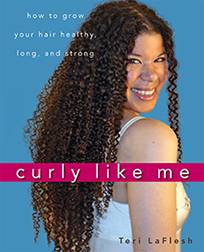
Available now!
Curly Like Me, the off-the-grid, do-it yourself owner's manual for tightly curly hair, is ready for ordering. Grab your copy today!

Every purchase made from
this site (through Amazon)
helps support it — and it
doesn't cost you anything
extra.
|
|
Here are some of the questions I get asked the most, and what my answers have been.
This way you can get your answers immediately, without having to wait on me.
And you never know, you might find answers to a few questions you didn't even know you had yet.
*This is still a work in progress. I'm continuing to add many more questions, and we are still ironing out a few quirks.
But we wanted to make this available as soon as possible.
There are several ways to choose the question(s) you'd like answered:
... or you can ...
... or you can ...
|
|
|
|
|
| |
Question:
My friends/coworkers/family/in-laws/hairdresser/strangers say I should "Train" my daughter's hair to make it grow. Is this true?
Answer:
There are so many terrible myths and old wives tales about how to make hair grow faster. Since our rate of growth is genetically determined, there is nothing you can do to speed it up. All you can do is make sure it has the chance to grow as fast as it's programmed to, such as eating well, and preventing damage.
That being said, pulling back a child's hair to "train" it would, in fact, damage her hair, maybe even permanently. The type of damage is called Traction alopecia, and can lead to permanent hair loss and bald spots.
Sadly, there are many, many people who suffer from this very condition, caused by...pulling their hair back tightly. This is often seen in long term weave and braid wearers, but also in those who feel they must pull their hair back into a pony tail with such force it pulls the skin of their face back too. Over time, that relentless pulling damages the follicles beyond repair, and afterwards the follicles can no longer grow hair. Often this is first noticed by a hairline that seems to inch farther and farther back away from the face and ears over the years.
I know your friends/ coworkers/ family/ inlaws/ hairdresser/ strangers on the street mean well, but they are relying on old wives tales, not fact—and their misinformation can hurt your child. And not to be snarky, but how does their hair look, anyway? Is it healthy, long and flowing (and NOT a weave)? How is their hairline looking?
There are many unfortunate myths in the community that keep us having damaged hair; and then we believe the myths and go about believing we have inherently awful hair. The irony is that it's how we are taught to take care of our hair that can make our hair awful, not our beautiful hair by itself, if it weren't damaged.
|
|
|